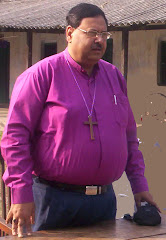Saturday, February 9, 2013
Tonight our team wrote thank you’s to all who have hosted us these past two weeks. They have taken phenomenal care of us and tended to our every need with such care. Gracious, gracious hospitality. Our team has clicked so well. You can’t live this close without coming to really know one another, and we have handled the inevitable bumps with humor and a lightness of spirit. Shawnee Irwin has worked tirelessly to coordinate this trip start to finish from our end, and has done a phenomenal job. The Rev. Dr. Norma Hanson has tended to our spiritual care with rich worship every evening—just the right focus each night. She has been a great chaplain to our team. Each of the other members, Betty Jo, Libby, Jim, and Susanne, have each brought a unique gift to our common mission in being here. It has been an absolute privilege to share this experience with them.
Dear Friends in Christ—
This morning was our time to go marketing! We headed off to Benachity with Archana and
Lorraine as our able guides. This is a
traditional Indian market with all the various stalls and shops. It was great fun, and even more fun to watch Archana
and Lorraine bargain with the shopkeepers—they are tough negotiators!
This afternoon, I felt like a kid who couldn’t go out at
recess. I buckled down after lunch to
write my sermon for tomorrow morning’s 7:00 AM when I really wanted to be
playing. I got it done in time to go
play with the kids on the play court in the late afternoon. We played the wildest game of basketball of
my life—I think it was 8 on 8 (I lost count at 16 players), girls against boys. It was a blast. We did a sort of gangnam style dance each
time we scored a goal. I think the
gangnam move also came into my hokey pokey, or so I am told—I must be channeling
my daughter as I dance. The other
members of our delegation said the elders yesterday really loved watching me “shake
it all about.” I think this is what it
means to be a fool for Jesus.
After the basketball/football game, I gathered up the girls
to teach me a traditional Indian dance so that I can teach our children at St.
Luke’s. We videotaped some of the moves,
so hopefully I can remember them when I get home. The girls then gathered around me, and we
took turns reading the poems from the St. Luke’s kids, and I gave them the
picture of our parish to put on their bulletin board. The kids are writing a note back to our kids
tonight which they will give to me at church tomorrow.
The kids realized today that we are leaving tomorrow. They are sad about our going. We are sad about leaving. This part is hard. They have worked their way into our
hearts. They asked me not to forget
them. I teared up, and I told them that
we couldn’t forget them because they are now in our hearts. We can write back and forth. Being here, I know that letters and cards we
write really do get to these children, and letters that they write back really
do get mailed to us. This would be a
great way for our WNC kids to continue a relationship with the kids here. I know tomorrow’s final goodbyes will be
hard.
Tonight our team wrote thank you’s to all who have hosted us these past two weeks. They have taken phenomenal care of us and tended to our every need with such care. Gracious, gracious hospitality. Our team has clicked so well. You can’t live this close without coming to really know one another, and we have handled the inevitable bumps with humor and a lightness of spirit. Shawnee Irwin has worked tirelessly to coordinate this trip start to finish from our end, and has done a phenomenal job. The Rev. Dr. Norma Hanson has tended to our spiritual care with rich worship every evening—just the right focus each night. She has been a great chaplain to our team. Each of the other members, Betty Jo, Libby, Jim, and Susanne, have each brought a unique gift to our common mission in being here. It has been an absolute privilege to share this experience with them.
Church at 7:00 AM tomorrow and then we head for Kolkata
about 11:00. We will spend the night
there before flying out on Monday afternoon.
Please hold us in your prayers as we make the last leg of this
journey.
We continue to hold all of you close in our thoughts,
especially as we gather for worship tomorrow.
One Lord, one faith, one baptism, we all share in the one cup—even when
we are half a world away.
In the peace of Christ,
Cyndi



